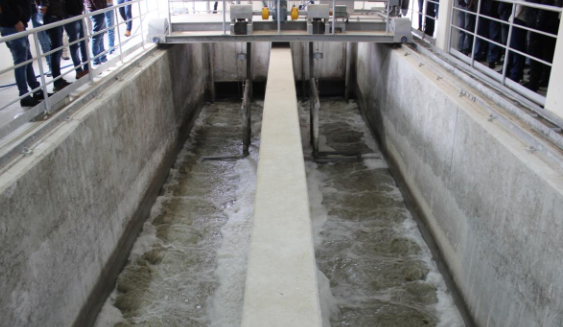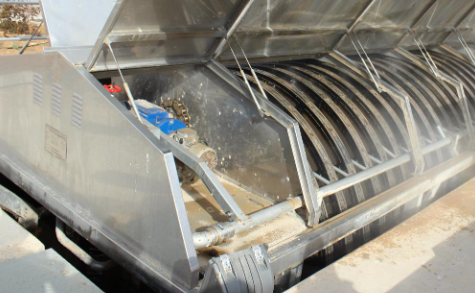Wastewater Treatment
1- ON-SITE WASTEWATER TREATMENT
In order to fulfill environmental and hygienic requirements, Al-Mustaqbal University has established a compact pre-treatment centralized wastewater facility with a capacity of 120 m3/day and an efficiency rating of up to 95%. This facility is situated in the southeastern corner of the university premises. The untreated wastewater is transported to the plant using subterranean screw pumps. Subsequent to the treatment process, the processed wastewater is directed into the wastewater collection system under the regular scrutiny of the Municipal authority to ensure compliance with set standards (BOD < 40 mg/L and TSS < 60 mg/L).
The wastewater plant comprises the following units:
• Bar screen
• Aerated Grit Chamber
• Rotated nano-filters
• Chlorination
Complete Read


Events & Forums
The forum placed a central emphasis on exploring the pivotal role that universities play in driving water conservation efforts and promoting sustainability practices. The event provided a platform for researchers, academics, and experts to delve into critical aspects of water management, shedding light on innovative strategies and practical approaches that can be adopted to address the growing concerns surrounding water scarcity and sustainable water usage.
The topics covered during the conference were comprehensive and impactful.
Researchers tackled key subjects that are crucial for advancing water conservation and sustainability agendas
, the Department of Construction and Building Technologies took a proactive step by orchestrating an impactful educational awareness campaign.
The core objective of this campaign was to illuminate the crucial issue of freshwater pollution, shedding light on its primary causes.
In a world where environmental challenges are becoming increasingly pressing, the campaign played a vital role in fostering public understanding about the factors that contribute to the contamination of our precious water sources.
The campaign was not merely a one-sided affair; rather, it was an interactive platform that facilitated dialogue and engagement. Attendees had the opportunity to actively participate in discussions, ask questions, and share their perspectives on the issue
approach fostered a sense of community involvement and encouraged participants to become ambassadors of change in their own right.
Through the campaign, a visit was conducted to the Euphrates River in Babylon, and several activities were carried out with the aim of enhancing the current state of this river .
Ultimately, this awareness campaign was not just a standalone event but a step towards instigating lasting change. By addressing the root causes of freshwater pollution and empowering individuals with knowledge, the Department of Construction and Building Technologies demonstrated its commitment to advancing sustainable practices. The ripple effects of this campaign are expected to extend far beyond its immediate impact, resonating with individuals as they make conscious decisions to safeguard our invaluable water resources.
Complete Read
Water Consumption
1- Consumption on campus
The University has proactive measures to implement a water conservation policy. As part of this initiative, the university has installed numerous water meters to accurately measure the volume of water used for drinking purposes. For irrigation of the fields and gardens, water is sourced from a nearby irrigation canal connected to the Euphrates River. The irrigation water flow is regulated using an open channel with a V-Notch weir to determine the discharge . The water storage is managed through control panels situated in each building, overseen by specialized engineers. The installation of these water meters and control panels serves not only to collect data on the amount of water consumed but also to encourage responsible water usage by discouraging wasteful practices.
Furthermore, Al-Mustaqbal University is known for its green areas and landscaping and as a result these areas require water for irrigation. The installed water meters help the engineering unit to acquire data on the efficiency of their sprinkler and drip irrigation systems used for watering these green areas. As a result, achieving the use of a minimum amount water in watering the green areas spread on the vicinity of the campus.
2- Prevention water from pollution
At Al-Mustaqbal University, a clear demarcation between rainwater and wastewater collection systems is maintained (separate system), preventing any cross-contamination between the two. Rainwater is channelled into a sizable subterranean storage tank. This collected rainwater finds purpose in two ways: it is either reused for irrigation purposes or employed for spraying the streets within the university premises.
Complete Read
Water Reuse
1- Legislation and strategy
Water scarcity is a pressing challenge both for urban and rural communities in Iraq. Climate change is an increasingly challenging prospect to water supply and resources; therefore, Al-Mustaqbal University c has set a policy that requires both staff and students should follow to achieve water conservation. Al-Mustaqbal University views water from four inter-related dimensions of efficient dimensions of efficient conservation, responsible consumption and restoring and retaining surface and groundwater.
A- FUNDEMENTAL ONE: WATER NUETRALITY BY 2030
• All buildings constructed or under construction should be fitted with water-efficient fixtures.
• Ensuring a 100% treatment and recycling of greywater and 50% of sewage by 2030. Sewage will be treated by state-of-the-art technologies that ensure an efficient recycling process.
• Rainwater should be harvested using efficient methods to implement water neutrality.
B- FUNDEMENTAL TWO: WATER STORAGE:
• By 2030, all conserved water that is in excess from need should be stored through ponds, wells and tanks. Seeking methods that minimise the evaporation of stored water is highly recommended.
• Increasing the number of water meters to identify the areas in which water usage is the greatest.
• Taking special attention to improve water governance by building awareness among staff, students, and implementing constant maintenance procedures to minimise waste.
Complete Read
Free Drinking Water
1- Quality and Quantity
The primary source of potable water for consumption within the university premises is purified Reverse Osmosis (RO) water, contained in sterilized water bottles. This RO water is produced by a compact RO treatment unit with a daily capacity of 10 m3. The dimensions of the treatment unit are 2 meters in height, 3 meters in width, and 3 meters in depth
To facilitate convenient access to drinking water, Al-Mustaqbal University has strategically positioned a multitude of water dispensers across its various units.
This initiative serves students, faculty, staff, and visitors alike, providing them with unfettered access to clean drinking water. Notably, the university extends the privilege of complimentary drinking water to all its employees and visitors.
As a benevolent gesture, the College frequently distributes free drinking water glasses within department lobbies.
This practice reinforces the university's commitment to the welfare of its students, staff, and visitors.Similarly, during examinations, the university systematically distributes water bottles to students, invigilators, committees, and faculty members. These bottles are usually chilled during the summer days
Complete Read